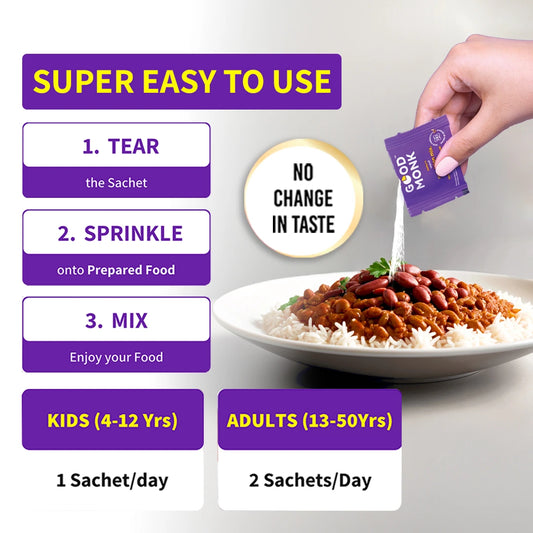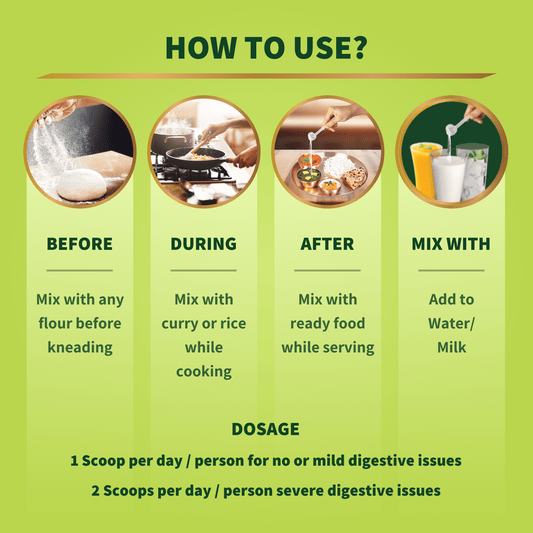Mealtime struggles are common in most households, and if you feel like your child is a picky eater, you’re not alone!
A study conducted across eight countries found that 81% of Indian mothers consider their children to be picky eaters.
The study carried out in Kolkata, Chennai, Bangalore and Hyderabad also revealed that parents may not be aware that their behaviour such as bribing or threatening such picky eaters to eat could unintentionally exacerbate the problem, Dr Benny Kerzner, Chairman, Department of Gastroenterology and Nutrition at Children's National Medical Center, George Washington University School of Medicine, said (1).
Another survey conducted by Abbott Nutrition, consisting of 3,000 mothers and children (aged 2–10), revealed that more than half of the children were labelled as picky eaters (1).
What Is Picky Eating?
Picky eating is very common among children aged 2 to 10 years old. Some of the common food habits seen are:
- Readily available ultra-processed food is high in sugars, salt, and unhealthy fats. Such foods attract kids more, making them ignore homemade, wholesome, nutritious foods.
- Regular consumption of such highly sugary or salty foods that are also colourful makes the mildly flavoured vegetables and fruits less appealing.
- Increased screen time can decrease a child’s interest in mindful eating due to highly stimulating content.
While this can be frustrating for parents, the good news is that you can encourage better eating habits without stress with the right approach.
What Causes Picky Eating
Firstly, let us understand what causes picky eating,
1. Low appetite
- Excessive concern despite normal growth
- An energetic child with a limited appetite, where the child is not eating properly>
- A withdrawn child – malnutrition due to depression, anorexia.
- An underlying disease condition
2. Selectivity in food choices
- Neophobia amongst the 1 – 2-year-olds is very common. New food can be accepted by them after repeated exposure. It is normal for a child to reject a new food, but it can be resolved once these foods are present in the diet repeatedly and cooked interesting way.
- Although mild selectivity to certain foods is also normal, repeated exposure to these foods will not result in acceptance of them. Here, the concern may not be nutrition, but forceful feeding practices may aggravate and result in long-term feeding issues.
3. Feeding style
- Controlling feeders ignore the child’s signs of hunger and use inappropriate feeding techniques like punishing or rewarding to persuade eating. This can result in severe consequences of picky eating, where there are higher chances of the kid being underweight or overweight (2).
How to Deal with Picky Eaters: Solutions
Although mealtime difficulties are frequent, you and your child can both enjoy eating more if you make a few easy adjustments. The following tips will help you on how to deal with picky eaters.
1. Recognise Your Child's Eating Habits
Every child has different eating preferences and appetites. Instead of pressuring them to eat, pay attention to their natural hunger signals.
2. Reduce Meal-Related Stress
Don't force or bribe your kid to eat. Avoid power struggles and maintain a calm atmosphere during mealtimes. By power struggles, we mean avoiding the stressful back and forth with the child (e.g., “if you eat your carrot, you’ll get ice cream later”). It’s always better to develop healthy eating for picky eaters and let the child decide how much to eat.
3. Establish a Mealtime Schedule
To let your child know when to expect food, set aside specific times for meals and snacks. Instead of stuffing them with snacks or liquids in between meals, simply serve them a bottle of water in their favourite sipper.
4. Minimise Mealtime Screen Time
Distracting devices include phones, tablets, and TVs. Avoid using screens at mealtimes to promote mindful eating.
5. Make Mealtimes Joyful
Eating is made more pleasurable in a peaceful and comfortable setting. Avoid scolding or forcing your child to finish their plate.
6. Offer the Right Foods in the Right Way
- Serve small portions of both new and familiar food items such as fibre foods for picky toddler.
- Limit meal timings to 20 to 30 minutes.
- Provide four to six meals or snacks each day, free from interruptions or distractions (2).
Staying consistent and patient with these habits can help build a healthy relationship between food and your child.
Picky eating over a long period can result in multiple nutritional deficiencies that can lead to inconsistent or slower growth, poor cognition, and low immunity. This could be a sign of a potential nutrition gap. But the power of Superheroes milk mix and Good Monk Family Nutrition Mix can help along this journey!
- Simply add 1 to 2 scoops of Superheroes milk mix into your child’s milk, and voila, you have unlocked the 5 Nutri Powers for the day!
It contains prebiotics, probiotics, essential vitamins, minerals, growth supporters like amino acids, and powerful functional ingredients like DHA, lutein, and zeaxanthin.
All these ingredients can help support your child’s gut health, immunity, energy levels, eye health, and brain health.
- If your child isn’t a very avid milk drinker or is very picky, then we have just the right weapon! A simple addition of 1 sachet of Good Monk Family Nutrition Mix in a day into your child’s daily meal will blend essential vitamins and minerals into their food seamlessly without changing its taste, colour or smell. This way, you can easily smuggle NUTRITION into their daily diets.
- These essential vitamins and minerals, with lysine, can help them improve their immunity and support healthy growth. One sachet a day for 4-12 years and two sachets per day for 13 years and above.
These are some of the effortless ways to bridge the gap between nutrition, even on days they eat less!!
Please consult your paediatrician for the supplement's compatibility with your child and to decide its dosage. Maybe your child doesn’t even need it!
Conclusion:
Picky eating can be a challenging phase for parents and their children; therefore, it's important to tackle this with patience, easy, creative strategies, and encouraging happy meal timings. By this, you won’t just take care of your child’s nutrition and growth but also build a strong emotional relationship between you and your child.
FAQs On Picky Eating
1. What is a picky eater?
A picky eater is someone who consumes a limited variety of foods, often refusing both familiar and unfamiliar items due to strong preferences or aversions. This behaviour is common in children but can persist into adulthood.
2. Is picky eating unhealthy?
Picky eating can lead to poor dietary variety and potential nutrient deficiencies, especially if it persists, but not all picky eaters experience negative health effects. Extreme cases may impact growth or development and should be monitored.
3. At what age is picky eating most common in children?
Picky eating is most common between ages 2 and 4, coinciding with toddlers asserting independence and developing food preferences. Many children outgrow this phase as they get older.
4. What is the psychology behind picky eaters?
Picky eating often stems from a desire for independence, sensory sensitivities, and a need for control, especially in young children. Emotional reactions to certain foods and anxiety about new textures or flavors can also play a role.
5. Can supplements help picky eaters?
Supplements may help fill nutritional gaps if a picky eater’s diet lacks essential vitamins or minerals, but they should not replace efforts to encourage a balanced diet. It’s best to consult a healthcare professional before starting supplements.
References:
1. 81% of Indian mothers consider their child picky eater: Study. DNA [Internet]. 2013 Nov; Available from: https://www.dnaindia.com/health/report-81-of-indian-mothers-consider-their-child-picky-eater-study-1289783
2. Kerzner B, Milano K, MacLean WCJ, Berall G, Stuart S, Chatoor I. A practical approach to classifying and managing feeding difficulties. Pediatrics. 2015 Feb;135(2):344–53.
Related articles:
- Overcoming fussy eating habits in kids
- Non-toxic probiotic food for kids
- The truth about your child’s diet
- Smart mom’s secrets
- Benefits of milk for kids
About the Author
This blog was written by Nawal Fathima, R&D Nutrition Innovation Executive at Good Monk —a clean and honest nutrition brand supported by doctors and food scientists. Every product is backed by clinical studies and made to help families eat better, feel better, and live healthier every day.
Popular Searches
Health Drink For Senior Citizens | Family Health Nutrition Combo | Multivitamin with Probiotic | Fiber powder | Wellness Gift | Milk Mix | Pineapple Powder | Juice Powder | Orange Energy Drink
















